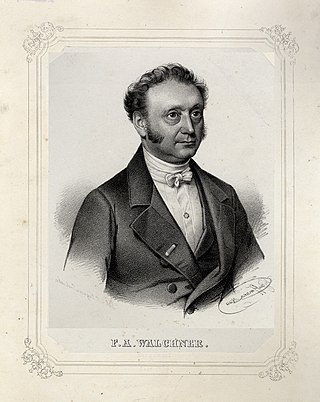Related Research Articles

The University of Freiburg, officially the Albert Ludwig University of Freiburg, is a public research university located in Freiburg im Breisgau, Baden-Württemberg, Germany. The university was founded in 1457 by the Habsburg dynasty as the second university in Austrian-Habsburg territory after the University of Vienna. Today, Freiburg is the fifth-oldest university in Germany, with a long tradition of teaching the humanities, social sciences and natural sciences and technology and enjoys a high academic reputation both nationally and internationally. The university is made up of 11 faculties and attracts students from across Germany as well as from over 120 other countries. Foreign students constitute about 18.2% of total student numbers.

The Philipps University of Marburg was founded in 1527 by Philip I, Landgrave of Hesse, which makes it one of Germany's oldest universities and the oldest still operating Protestant university in the world. It is now a public university of the state of Hesse, without religious affiliation. The University of Marburg has about 23,500 students and 7,500 employees and is located in Marburg, a town of 76,000 inhabitants, with university buildings dotted in or around the town centre. About 14% of the students are international, the highest percentage in Hesse. It offers an International summer university programme and offers student exchanges through the Erasmus programme.

Helmut Rix was a German linguist and professor of the Sprachwissenschaftliches Seminar of Albert-Ludwigs-Universität, Freiburg, Germany.

The Gottfried Wilhelm Leibniz Prize, or Leibniz Prize, is awarded by the German Research Foundation to "exceptional scientists and academics for their outstanding achievements in the field of research". Since 1986, up to ten prizes have been awarded annually to individuals or research groups working at a research institution in Germany or at a German research institution abroad. It is considered the most important research award in Germany.

The University of Freiburg Faculty of Medicine is the medical school and dental school of the University of Freiburg and forms university's biomedical research unit together the University Medical Center Freiburg. The faculty was founded in 1457 as one of Germany's oldest and is regarded among its most distinguished. Institutes and buildings are located at the Medical Center campus in Freiburg's Stühlinger district and in the Institute Quarter in the Neuburg district. The Faculty of Medicine consistently ranks very highly in a variety of national and international rankings, such as those published by the German periodicals Der Spiegel and Focus. The University of Freiburg is ranked 4th in Germany in funding for life sciences research by the German Research Foundation overall and ranked 2nd in funding per professor.

Freiburg Botanical Garden is a botanical garden in the Herdern district at Schänzlestraße 1, Freiburg im Breisgau, Baden-Württemberg, Germany and is associated with the University of Freiburg as the "Forschungs- und Lehrgarten der Universität Freiburg" of the Faculty of Biology. The current director of the garden is Professor Dr. Thomas Speck.
The Paul Ehrlich and Ludwig Darmstaedter Prize is an annual award bestowed by the Paul Ehrlich Foundation since 1952 for investigations in medicine. It carries a prize money of 120,000 Euro. The prize awarding ceremony is traditionally held on March 14, the birthday of Nobel laureate Paul Ehrlich, in the St. Paul's Church, Frankfurt am Main.
Hans Lenk is a German rower who competed for the United Team of Germany in the 1960 Summer Olympics, and an Emeritus Professor of Philosophy. He was born in Berlin.
Heino Finkelmann is a retired German chemist in the area of liquid-crystalline elastomers.

Ulrich Förstermann is a German physician and pharmacologist.

Gunther O. Hofmann is a German surgeon, biophysicist, and professor.
Bernhard Maier is a German professor of religious studies, who publishes mainly on Celtic culture and religion.

The Faculty of Biology is one of the eleven faculties of the University of Freiburg in Freiburg im Breisgau, Baden-Württemberg, Germany. It is part of a strong life sciences network including institutions such as the Max Planck Institute of Immunobiology and Epigenetics, the Bernstein Center Freiburg (BCF), the Center for Applied Biosciences and the Center for Biological Systems Analysis, which started operations in 2008 as offspring of the Freiburg Initiative for Systems Biology (FRISYS), funded by the Federal Ministry of Education and Research (BMBF).

Friedrich August Walchner was a German geologist, chemist and mineralogist.
Eduard Gaugler was a German researcher, economist and former professor for human resource management at both the University of Regensburg and the University of Mannheim from 1972 to 1989. Moreover, he served as rector of the University of Mannheim between 1973 and 1976.

Paul Diepgen was a German gynecologist and historian of medicine. He was born in Aachen.
Thomas Leinkauf is a German philosopher and a professor at Westfälische Wilhelms-Universität Münster. His fields of interest are late antique, Renaissance and early modern philosophy, as well as Idealism.
Woldemar Gerschler was a German athletics coach responsible for the German national middle-distance runners at the 1936, 1952, 1956 and 1960 Olympic Games. He was one of the pioneers of interval training and coached several world-record holders such as Rudolf Harbig, Gordon Pirie and Roger Moens.

Joseph Maria Müller-Blattau was a German musicologist and National Socialist cultural official. He is regarded as a "nestor of Saarbrücken musicology" but also as a "singer of a musical seizure of power" because of his activities in National Socialism.
Albrecht Riethmüller is a German musicologist.
References
- ↑ "Personendatenbank der Landesbibliographie Baden-Württemberg" . Retrieved 24 August 2021.
- ↑ "erv - muscle - tendon: Why is specific training necessary in junior competitive sport?" (PDF). sportland.nrw. de (in German). Archived from the original (PDF) on 21 September 2018. Retrieved 24 August 2021.
- ↑ Albert Gollhofer (1987). Components of fast strength performance in the stretch-shortening cycle. Erlensee: SFT-Verlag. ISBN 978-3-925083-02-0 . Retrieved 24 August 2021.
- 1 2 "DoppelfOERderung: Lernen durch Lehren an und mit Geräten" (PDF). ifss.uni-freiburg.de. Retrieved 24 August 2021.
- ↑ "Albert Gollhofer". freidok.uni-freiburg.de. Retrieved 24 August 2021.
- ↑ "Former-board-members-of-the-dgfb - DGfB" . Retrieved 24 August 2021.
- ↑ "Instructional Development Award (IDA) - Central University Administration". zuv.uni-freiburg.de. Retrieved 24 August 2021.
- ↑ "Faculty of Economics and Behavioural Sciences". Albert-Ludwigs-Universität Freiburg. 2006-11-09. Retrieved 24 August 2021.
- ↑ Hans-Hermann Dickhuth (2011). Einführung in die Sport- und Leistungsmedizin : For students of sport. Sport and Physical Education. Grundlagen für Studium, Ausbildung und Beruf (2., rev. and upd. ed.). Hofmann. ISBN 978-3-7780-8462-5 . Retrieved 24 August 2021.
- ↑ Albert Gollhofer (2009). Handbuch Sportbiomechanik. Beiträge zur Lehre und Forschung im Sport. Hofmann. ISBN 978-3-7780-4710-1 . Retrieved 24 August 2021.